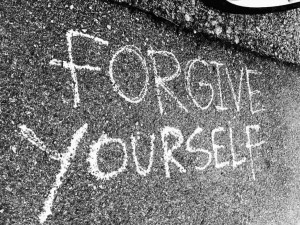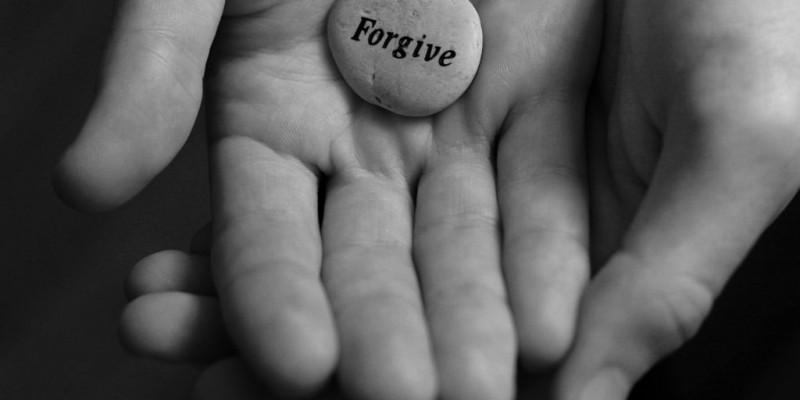If we do not learn to forgive then our hearts become plagued with emptiness and our minds riddled with negative thought. Sometimes it is not easy to forgive, especially when we feel wrong has come to us, or worse; wrong has come from us.
It can be just as difficult to forgive ourselves when we feel we have caused harm, as it is to forgive another. We must find the power to make apologies and make right our wrongdoings, but we must also find the power to forgive.
It is important to forgive so that our minds can be clear, and so that we can be happy. We can never be happy as long as we bear grudges because these grudges will come to occupy our thoughts, distracting us from our own life, and ultimately from positivity. When we forgive we remove the dark cloud from above our heads, and our mind runs free like the trickle of a stream again.
A grudge, either for ourself or for others, blocks the flow of our thoughts; forgiveness removes the blockage.
Barriers Preventing Forgiveness
Egocentricity– “No one should cause me harm,” “I am better than them anyway,” “They don’t deserve me as a friend,” “I would never do that to them.” Our ego can churn up a million reasons why we should not forgive someone, because forgiveness is humble and graceful, and the ego doesn’t really like that. It likes stubbornness and a hard outer shell. Forget about your ego, and forgive.
Guilt Complex– Some people experience guilt with a velocity factor 100x higher than others. We must love ourselves, and understand guilt as a moral compass. Then we must learn to let go, and forgive ourselves. For those with a tendency towards guilt, I suggest you look around you and become aware that no one is perfect, and that everyone offends. Let go of guilt to forgive yourself.
Lack Of Understanding And Compassion– When we live at the center of our universe, which lets face it is quite easy to do, we forget that other people have their own problems, blessings, personalities, vices, and that they have their own life. We forget to account for their humanity, and for our own. Without understanding and compassion, it is impossible to forgive. Cultivate understanding and compassion, and realize that people are just trying to get on with their own lives.
Accidents Do Happen
Often, our inability to forgive other people comes from our self-centered nature. We think that no one has the right to offend us or do us harm, and that every one should be careful to tip-toe around us, so that they don’t offend us.

If someone offends us simply in their being, or by them saying or doing what they feel is right, then we should find it in our hearts to forgive them, and recognize that they have not even done any harm; it is our own judgement causing the problem. Similarly, if harm comes to us in the form of an accident, we should not hold anyone to blame.
The trick in this case is to acknowledge the initial reaction and then to let go of any negative feelings. Of course, our initial instinct is to think badly if harm comes to us, and often we look for someone to blame. But once our emotional reaction has resided we have to learn to forgive, and a little understanding goes a long way in this situation. We must drop our ego and know that the other person meant no harm. Forgive them for their mistake, it could have happened to anyone, including you.
In the case of a person offending you through their being alone; again this is something that should be addressed internally and with the person, and should not be held as a grudge.
Sometimes personalities clash, conflicts arise, and opinions differ. It is a part of life, and it is an expression of our unique individuality to be involved in these clashes from time to time. Again understanding is the key; understand that you also have a role in the clash, and do not direct all of your negativity towards another person. Learn to enjoy these clashes as opportunities to grow, and be quick to forgive those who offend.
Dealing With Malice
If someone acts maliciously towards you, then there are going to be a few considerations to make before you will be able to fully forgive; but forgiveness is always the goal. Firstly, have you caused harm to this person in the past, and are you both locked in an ego war? If yes then the apparent malice is nothing more than a behavioral loop, and nothing that should be taken to heart. If the answer is no, and in all honestly you cannot conceive a time where you have done wrong to this person, then perhaps their malice is more disconcerting.
Still it is easy to understand. When a person acts out of malice they are very often attacking themselves. They do not know this to be the case; if they did they would not behave in this way. When we attack another person, very often we are attacking an aspect of our own being that we see in them. Either that, or we are acting out of some manner of jealousy; for their successes, or situations, or for traits that we admire in them but are too egocentric to admit.
To forgive someone does not necessarily mean to befriend them, or to keep them in close company. If someone causes us harm, especially if it seems to happen repeatedly, then we should consider whether they are worth our involvement and energy. This does not mean we should hate them. It simply means that we can choose to detach ourselves from them, to give them less of ourselves until we believe they can be positive towards us again. We still forgive them; we let our mind and heart be free of the wrongdoing, and we bear no grudges.
So, when we fall victim to malice we must demonstrate a powerful unspoken silence; we know the person we are dealing with has negative emotions stirring within, and that they are facing internal challenges in their own life. This is the way the Buddha learned to love everyone. He knew they were suffering. The power of forgiveness is stronger than any hate we could return, because in the process of forgiving we also develop a deep empathy; a love and understanding for the person.
Forgiving Ourselves
So what if it is ourselves who we are struggling to forgive? Well in the case of us attacking or causing deliberate harm to someone else, we know from what we spoke about above that we are actually engaging in an internal battle with ourselves. When we find ourselves acting maliciously and thinking negatively we should quickly examine ourselves to see what we can learn. Internalize the malice and put the microscope over your own mind; why do you feel like this? What is it that makes you want to act this way? What aspect of yourself is acting defensively?

Guilt is a strong human emotion that acts in two ways. The first is its true function; it acts as a guidance which indicates to us our moral boundaries, our own internal sense of right and wrong. We feel guilty because we have overstepped our own mark, and because we know we went too far. Whether we acted emotionally and said some harmful words, acted out of malice, took part in manipulative game playing, or any other form of wrongdoing, we should feel some sense of guilt; one would hope so anyway.
The second function of guilt is not really a function at all, rather it is a by-product of our inability to drop our guilt, and to forgive ourselves. It is known as wallowing, and it can lead to self-pity.
We must recognize that we have done harm, and in order to forgive ourselves we might first need to put something right; we can say we are sorry, or make it up to someone, or make it up to ourselves if that is the case. When we do this we feel an immense ethereal weight lift from our shoulders, as our guilt is alleviated. If we do this and we still feel guilty then we need to learn to forgive ourselves.
To forgive yourself know that you are human, and that you make as many mistakes as everyone else. Look around you at the imperfections and understand that no one, yourself included, will ever go through life without offending someone. Being completely inoffensive is actually offensive for some people, so even that is not an option. A truly expressive person always offends, and character clashes are as common in life as they are in novels. Don’t beat yourself up about it. Try to be a good person, and that’s that!
To forgive yourself you must love yourself, and know that you are taking part in a journey of self betterment. It is fine to make mistakes and you should be happy that your moral compass has told you that you should feel bad. So you know now not to be like that again; and the lesson is learned, and you can swiftly move on. Trust yourself, and forgive.
Final Thoughts…
When we have mastered the art of forgiving we can live in peace. We have left behind the burdens of negative thinking that stop us from getting on with life. We understand the imperfect nature of ourself and those around us, so we know that even if they mean us harm, it is only because they are crying out to be helped, to be loved. People offend people. It happens. Malice is an external result of an internal process, and there is immense strength and power in forgiving malice. Forgiving ourselves can be the most difficult, but with love, and the knowledge that we are good people, we can drop our guilt, and hold ourselves in the highest regard. The power of forgiveness gives us the power to love, and to be happy.
“O Lord Forgive Them For They Know Not What They’ve Done”

